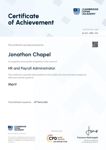Positive Handling in Schools: Trauma and Disability Management
CPD Accredited | Interactive Learning Materials | PDF Certificate Included | Tutor Support
Cambridge Open Academy
Summary
- Certificate of Completion (PDF) - Free
- Certificate of Completion (Hard Copy) - £9.99
- Exam(s) / assessment(s) is included in price
- Tutor is available to students
Add to basket or enquire
Overview
Have you ever wondered how teachers and school staff effectively manage challenging situations in the classroom while ensuring the safety and well-being of their students? In an educational setting, positive handling plays a crucial role in creating a secure environment for learning and growth. It involves a range of strategies and techniques that empower educators to de-escalate conflicts, support students with trauma or disabilities, and make informed decisions based on a duty of care. If you are passionate about fostering a positive and inclusive school environment, the course "Positive Handling in Schools: Trauma and Disability Management" is the perfect opportunity to enhance your knowledge and skills in this critical area.
Learning Outcomes:
- Gain a comprehensive understanding of Positive Handling principles and their application in a school setting.
- Identify and manage the various stages of the aggression curve to promote de-escalation and prevent harm.
- Develop strategies for trauma and disability management, ensuring appropriate support for students in need.
- Apply the SCARF model to minimise conflict and maximise cooperation among students.
- Navigate government advice and guidance to ensure compliance with relevant regulations and policies.
- Make informed decisions based on a duty of care towards students, prioritising their well-being and safety.
- Understand the laws surrounding positive handling, physical intervention, restraint, and the legal framework in educational settings.
- Learn effective techniques for physical intervention and restraint when necessary, prioritising safety and minimising risk.
- Acquire knowledge of screening, searching, and confiscation protocols to maintain a secure learning environment.
CPD
Course media
Description
Throughout the Positive Handling in Schools: Trauma and Disability Management course, you will explore trauma and disability management techniques, enabling you to provide compassionate and effective support to students facing these challenges. Uncover the power of the SCARF model, a framework designed to enhance social interactions and minimise conflict among students. Delve into the intricacies of government advice and guidance, equipping yourself with the knowledge to navigate the complex educational landscape with confidence.
With a focus on duty of care, you will learn to make informed decisions that prioritize student well-being and safety. Understand the legal aspects of positive handling, physical intervention, and restraint, ensuring compliance with relevant laws and regulations. Enhance your understanding of screening, searching, and confiscation procedures, essential components of maintaining a secure learning environment.
Enrol in this empowering course today and become a catalyst for positive change in schools. Together, let's create an environment where every student can thrive.
Who is this course for?
- Teachers and educators working in primary or secondary schools
- School administrators and support staff responsible for student well-being
- Individuals pursuing a career in special education or student support roles
- Parents and guardians interested in understanding positive handling strategies
Career path
- Special Education Teacher: £25,000 - £42,000 per year
- Learning Support Assistant: £15,000 - £22,000 per year
- School Administrator: £18,000 - £30,000 per year
- Behavior Support Specialist: £25,000 - £40,000 per year
- SENCO (Special Educational Needs Coordinator): £32,000 - £48,000 per year
- Educational Psychologist: £37,000 - £65,000 per year
Questions and answers
Currently there are no Q&As for this course. Be the first to ask a question.
Certificates
Certificate of Completion (PDF)
Digital certificate - Included
Certificate of Completion (Hard Copy)
Hard copy certificate - £9.99
Note: Delivery of hardcopy certificate is free within the United Kingdom. However, to obtain a hardcopy certificate, international students have to pay £19.99 for the shipment to their designated address.
Reviews
Currently there are no reviews for this course. Be the first to leave a review.
Legal information
This course is advertised on reed.co.uk by the Course Provider, whose terms and conditions apply. Purchases are made directly from the Course Provider, and as such, content and materials are supplied by the Course Provider directly. Reed is acting as agent and not reseller in relation to this course. Reed's only responsibility is to facilitate your payment for the course. It is your responsibility to review and agree to the Course Provider's terms and conditions and satisfy yourself as to the suitability of the course you intend to purchase. Reed will not have any responsibility for the content of the course and/or associated materials.



